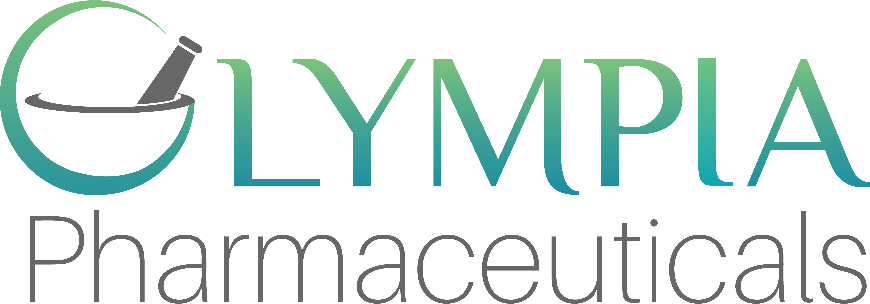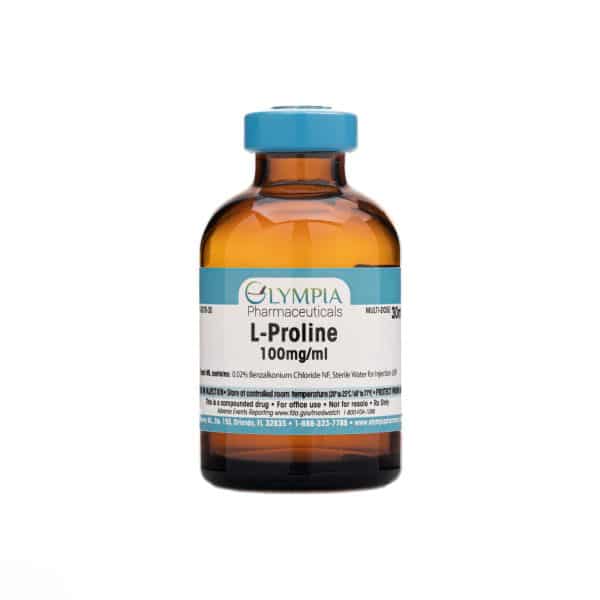Overview
L-proline (or just “proline”) is a non-essential amino acid, which means that it is naturally synthesized by the body but can also be obtained through a balanced diet. Amino acids are organic compounds that combine to form proteins, the fundamental building blocks of life. Specifically, proline is commonly found in high-protein foods like meat, fish and dairy products. Additionally, certain types of beans, vegetables, and even tofu contain a good amount of proline.
One of the primary roles of proline within the body is to contribute to the production of proteins such as collagen. Collagen is a vital protein that provides structural integrity to various body parts, including skin, bones and joints. In essence, proline helps ensure the strength, elasticity and regeneration of these tissues.
What Is L-Proline Prescribed For?
L-Proline is often prescribed by healthcare professionals to support the healing of skin and joints. Its role in collagen synthesis makes it a critical nutrient for tissue repair and wound healing. It is also recommended in certain instances of wound care and surgery, where increased collagen production is required for healing.
Moreover, some research suggests that proline supplementation might support cardiovascular health as proline aids in releasing fat build-up in the bloodstream, reducing the risk of arteriosclerosis (hardening of the arteries).
Benefits of L-Proline
Proline offers several significant benefits related to its roles in protein synthesis, metabolic function and immune response. By contributing to the structure of proteins, proline is integral to the maintenance and repair of body tissues. Its role in wound healing is crucial, particularly for post-surgical patients or individuals suffering from injuries that have led to skin damage or cartilage degeneration.
Proline also participates in antioxidative reactions, helping the body combat oxidative stress. Oxidative stress is linked to many chronic diseases like heart disease and cancer, so this antioxidative property of proline is potentially very important for overall health.
Athletes and those engaged in rigorous physical activities may also benefit from proline supplementation. It can help maintain muscle tissue after intense workouts by facilitating the repair of muscle fibers, supporting post-workout recovery and promoting overall muscle health.
Proline Injection Dosage, Concentration, Route of Administration
Dosage: Seek advice from a licensed physician, medical director, or other healthcare provider
Concentration: 100mg/ml
Route of Administration: IV/IM
L-Proline Side Effects and Precautions
While L-Proline is a naturally occurring amino acid and is generally considered safe, it’s important to always consult with your healthcare provider before starting any new supplementation regimen. This is especially true if you are pregnant, planning to become pregnant, or breastfeeding. The effects of supplemental proline on pregnancy and lactation are not fully understood, and thus caution is advised.
While no major side effects have been reported in the current scientific literature, individual responses to supplements can vary. Potential side effects may include gastrointestinal discomfort, such as bloating, diarrhea, or stomach cramps, particularly if taken in large doses. Allergic reactions, although rare, could also occur. Signs of an allergic reaction include rash, itching, swelling, severe dizziness, and trouble breathing.
It’s also important to consider possible interactions with other substances. For instance, proline might affect the absorption or effectiveness of certain medications. Moreover, individuals with liver or kidney disease should be cautious with amino acid supplementation, as their bodies might have difficulties processing excessive amounts of amino acids.
Adherence to the prescribed dosage is crucial. High doses of L-proline, especially over an extended period, may potentially result in an imbalance of other amino acids, thereby negatively affecting overall protein synthesis and metabolic function. Therefore, it’s always recommended to take supplements as directed by your healthcare provider.
Storage
Store at controlled room temperature. Protect from light.
Want to Learn More About L-Proline? Contact Olympia Today!


